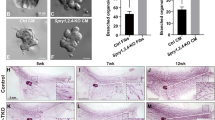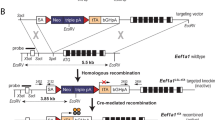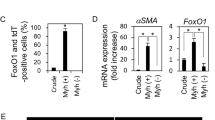Abstract
Fibroblast Growth Factors 3 (FGF-3) and 4 (FGF-4) were compared for the effects they each exert on EF43 mouse cells. This non-transformed mammary cell line appears to be myoepithelial mainly because it expresses α-smooth muscle actin. The EF43 cells were infected with similar vectors that carry either the short fgf-3 sequence (the product of which goes into the secretory pathway), fgf-4 or the selection gene only as control. In syngeneic animals, EF43.fgf-3 cells were tumorigenic only when orthotopically implanted whereas EF43.fgf-4 cells invariably gave rise to aggressive tumors. However, both tumor types were metastatic as evidenced by the blue micrometastases observed when the implanted cells expressed lacZ. In vitro, the FGF-3 producing cells were strongly invasive in matrigel coated chambers whereas the EF43.fgf-4 cells only were invasive in type I-collagen gels. Interestingly, FGF-3 production greatly stimulated the synthesis of pro-MMP-9 (Matrix Metalloprotease-9) and, to a lesser extent, that of pro-MMP-2. FGF-3 also up-regulated the production of plasminogen activators. In contrast, FGF-4 had no effect on these secretions and the medium conditioned by the EF43.fgf-4 cells displayed the largest plasminogen activator–inhibitor activity. These results show that FGF-3 and FGF-4 have distinct mechanisms of action on myoepithelial cells.
This is a preview of subscription content, access via your institution
Access options
Subscribe to this journal
Receive 50 print issues and online access
$259.00 per year
only $5.18 per issue
Buy this article
- Purchase on Springer Link
- Instant access to full article PDF
Prices may be subject to local taxes which are calculated during checkout
Similar content being viewed by others
Author information
Authors and Affiliations
Rights and permissions
About this article
Cite this article
Hajitou, A., Baramova, E., Bajou, K. et al. FGF-3 and FGF-4 elicit distinct oncogenic properties in mouse mammary myoepithelial cells. Oncogene 17, 2059–2071 (1998). https://doi.org/10.1038/sj.onc.1202126
Received:
Revised:
Accepted:
Published:
Issue Date:
DOI: https://doi.org/10.1038/sj.onc.1202126
Keywords
This article is cited by
-
Ectodysplasin target gene Fgf20 regulates mammary bud growth and ductal invasion and branching during puberty
Scientific Reports (2017)
-
A novel gene STYK1/NOK is upregulated in estrogen receptor-alpha negative estrogen receptor-beta positive breast cancer cells following estrogen treatment
Molecular Biology Reports (2008)
-
Wnt-1 and int-2 mammary oncogene effects on the β-catenin pathway in immortalized mouse mammary epithelial cells are not sufficient for tumorigenesis
Oncogene (2001)



